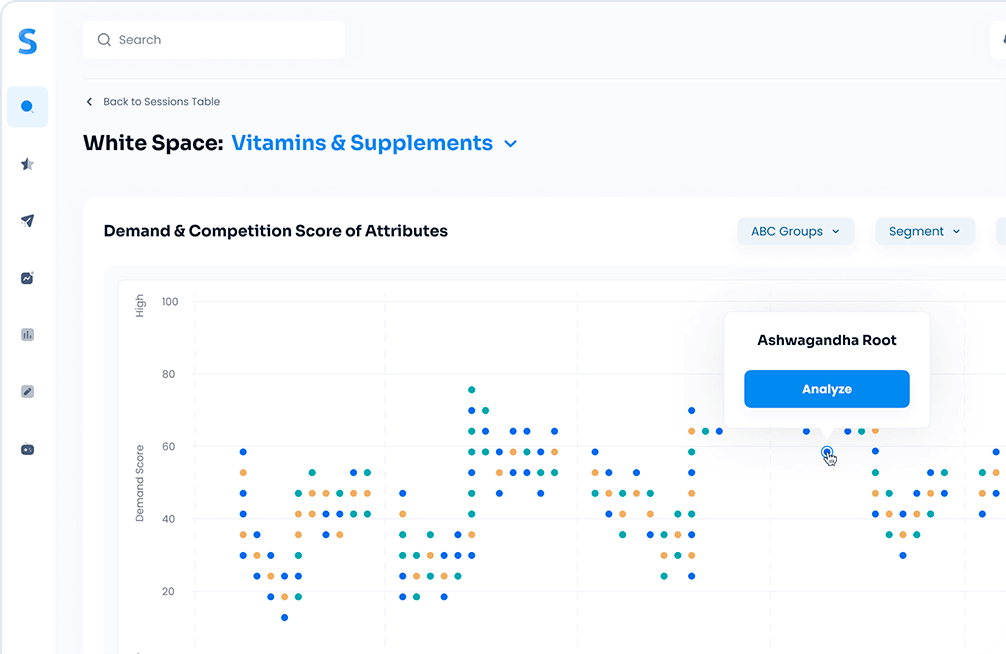Your Complete Guide to Synthetic Consumer Panels
Synthetic consumer panels are changing how businesses collect data, using AI to create simulated responses that resemble real consumer feedback. This guide answers 52 potential questions from 17 industry expert sources to explain how these panels work, their advantages and limitations, and what they mean for the future of market research. Whether you’re new to synthetic panels or looking to deepen your understanding, this FAQ provides clear and practical insights.
If you want to learn more about synthetic consumer panels or launch one, you can sign up to request one on our demo page here.
Synthetic panels offer a fast, cost-effective alternative to traditional research methods, allowing companies to quickly gather large amounts of data without needing to recruit actual participants. However, they also come with challenges, such as questions about accuracy and whether AI-generated data can fully capture real human behavior. In this FAQ, we explore these topics in detail, helping you decide when synthetic panels might be the right choice for your research and how to use them effectively.
Frequently Asked Questions (FAQ)
What are synthetic panels?
Synthetic panels are AI-generated datasets that mimic real consumer responses. They use machine learning models trained on existing data to create artificial survey participants and responses.
How do synthetic panels differ from traditional consumer panels?
Synthetic panels use AI-generated data while traditional panels involve real consumers. Synthetic panels are faster and cheaper but lack nuanced human insights.
What are the potential benefits of using synthetic panels?
Benefits include faster insights, lower costs, larger sample sizes, and testing of sensitive topics without risking participant discomfort.
What are the ethical considerations surrounding synthetic panels?
Ethical concerns include transparency, authenticity, bias, privacy, and accountability. Researchers must ensure responsible use of synthetic data.
How might synthetic panels evolve in the near future?
Future developments may include improved accuracy, greater customization, integration with real-time data, and ethical AI frameworks.
Are there any regulations or guidelines governing the use of synthetic panels?
Currently, no specific regulations exist, but general data protection laws like GDPR may apply. Industry guidelines are under discussion.
How can researchers validate the quality of data from synthetic panels?
Validation methods include comparing synthetic data with traditional research, statistical analysis, and ongoing quality checks.
What skills do researchers need to effectively work with synthetic panel data?
Skills include analytical expertise, data literacy, familiarity with AI tools, and the ability to interpret synthetic data effectively.
How do synthetic panels integrate with other market research methodologies?
Synthetic panels complement traditional methods, enabling hybrid approaches and enhancing predictive analytics.
What are some real-world examples of successful synthetic panel implementations?
Examples include rapid product testing in consumer goods, audience reactions in media, and shopper journey simulations in retail.
How do synthetic panels impact the speed of conducting market research?
Synthetic panels accelerate research by enabling instant data generation, iterative testing, and faster reporting.
What are the limitations of synthetic panels that researchers should be aware of?
Limitations include potential biases, lack of true human emotion, and challenges in capturing contextual nuances.
What role does AI play in the creation and management of synthetic panels?
AI drives synthetic panels by generating, managing, and validating artificial data for reliable market research insights.
How do synthetic panels address the challenge of ‘hard-to-reach’ demographics?
Synthetic panels simulate responses from niche groups, overcoming barriers to inclusivity and representation.
Can synthetic panels simulate consumer behavior in hypothetical scenarios?
Yes, synthetic panels simulate behaviors in scenarios like pricing changes or new product launches, aiding strategic planning.
What are the implications of synthetic panels for global market research?
Synthetic panels enable consistent and scalable research across regions, improving insights into diverse global markets.
How do synthetic panels account for cultural nuances and regional differences?
By integrating region-specific data, synthetic panels provide insights that reflect local preferences and behaviors.
What are the implications of synthetic panels for customer segmentation and personalization strategies?
Synthetic panels enable detailed segmentation and targeted strategies by simulating varied consumer profiles.
How do synthetic panels address the challenge of capturing emotional responses or sentiments?
AI models in synthetic panels simulate emotional responses, but qualitative methods enhance context and depth.
What are the cost implications of using synthetic panels compared to traditional panels?
Synthetic panels are generally more cost-effective due to lower recruitment and data collection expenses.
How do synthetic panels ensure data privacy and compliance?
Synthetic panels use anonymized and AI-generated data, ensuring compliance with privacy regulations like GDPR.
Can synthetic panels replace traditional research methods?
Synthetic panels can complement traditional methods but may not fully replace them due to limitations in capturing human nuances and emotions.
How do synthetic panels handle longitudinal studies?
Synthetic panels can simulate long-term data trends, making them useful for longitudinal studies without the need for repeated human engagement.
How can businesses start using synthetic panels?
Businesses can collaborate with providers offering synthetic panel solutions, ensuring alignment with their research objectives.
Can synthetic panels address bias in market research?
Synthetic panels can reduce bias by generating data from diverse profiles, although model training remains critical to accuracy.
What is the future of synthetic panels in market research?
The future includes improved accuracy, greater customization, integration with AI tools, and enhanced ethical frameworks.
How do synthetic panels compare with survey automation tools?
While survey automation tools streamline traditional methods, synthetic panels generate entirely new data, offering unique insights.
Can synthetic panels improve customer journey mapping?
Yes, synthetic panels provide detailed insights into hypothetical and real customer journeys, enhancing mapping efforts.
Are synthetic panels environmentally sustainable?
Synthetic panels reduce the environmental impact of research by eliminating physical logistics and reducing resource consumption.
What ethical guidelines govern synthetic panel use?
Although specific guidelines are emerging, general ethical AI principles and data protection laws currently apply.
How do synthetic panels address bias in market research?
Synthetic panels can reduce bias by generating data from diverse profiles, although model training remains critical to accuracy.
How do synthetic panels adapt to emerging markets?
Synthetic panels can be tailored to emerging markets by incorporating relevant regional data and consumer profiles.
What industries benefit most from synthetic panels?
Industries such as consumer goods, media, healthcare, and retail benefit significantly from the insights provided by synthetic panels.
How do synthetic panels integrate with AI-driven analytics tools?
Synthetic panels complement AI analytics tools, providing enriched datasets for more precise predictive and prescriptive analytics.
Do synthetic panels provide real-time insights?
Yes, synthetic panels can provide near-real-time insights, making them suitable for dynamic decision-making processes.
How do synthetic panels ensure data quality?
Data quality is maintained through rigorous AI model validation, benchmarking against traditional datasets, and continuous improvements.
What are the privacy benefits of synthetic panels?
Synthetic panels protect privacy by generating data without directly involving real individuals, reducing data security risks.
What challenges do synthetic panels face?
Challenges include potential biases in training data, limitations in emotional depth, and skepticism about authenticity.
Can synthetic panels predict market trends?
Synthetic panels can predict trends by analyzing historical data and simulating future consumer behavior scenarios.
How do synthetic panels address cultural and regional differences?
Synthetic panels incorporate region-specific data to ensure insights reflect local preferences and cultural nuances.
What are the implications of synthetic panels for customer segmentation?
Synthetic panels enable detailed customer segmentation and targeted strategies by simulating diverse consumer profiles.
Can synthetic panels simulate consumer behavior in hypothetical scenarios?
Yes, synthetic panels can simulate behaviors in scenarios like price changes or new product launches, aiding strategic decision-making.
What are the global implications of synthetic panels?
Synthetic panels enable scalable and consistent research across regions, providing insights into diverse global markets.
What is the role of AI in synthetic panels?
AI is fundamental to synthetic panels, driving data generation, validation, and analysis to create reliable insights.
How do synthetic panels capture emotional responses or sentiments?
Synthetic panels simulate emotional responses using AI, though qualitative methods are still essential for context.
How can businesses validate synthetic panel data?
Validation methods include benchmarking against traditional research and statistical analysis of synthetic datasets.
Are synthetic panels more cost-effective than traditional panels?
Yes, synthetic panels reduce recruitment costs and streamline data collection, making them highly cost-effective.
How do synthetic panels ensure compliance with regulations?
Synthetic panels generate anonymized data that complies with regulations like GDPR, ensuring data privacy and security.
What are some real-world applications of synthetic panels?
Applications include rapid product testing, market segmentation, audience response simulations, and competitor benchmarking.
What role does data diversity play in synthetic panels?
Diversity in training data is critical to ensure synthetic panels generate accurate and inclusive insights.
Can synthetic panels replace human researchers?
No, synthetic panels complement human expertise by offering scalable insights, but nuanced judgment and qualitative analysis remain essential.
How do synthetic panels benefit emerging industries?
Synthetic panels allow emerging industries to quickly test ideas and understand consumer behavior, even in nascent markets.
What is the accuracy of synthetic panel predictions?
The accuracy depends on the quality and diversity of the training data, as well as the sophistication of the AI models used.
How do synthetic panels improve time-to-market?
By generating immediate consumer insights, synthetic panels reduce the time required for data collection and analysis.
Are synthetic panels suitable for all industries?
While synthetic panels are versatile, industries relying heavily on emotional or contextual insights may still require traditional methods.
How are synthetic panels changing market research?
Synthetic panels are revolutionizing market research by offering faster, more scalable, and cost-effective data generation.
Closing Thoughts on The Synthetic Panel
Synthetic panels make it easier for companies to learn about customers. These tools use AI to quickly create fake but realistic customer responses, which helps businesses make faster decisions. While they can’t replace real customer feedback completely, synthetic panels help companies test new ideas and understand different types of customers. As AI gets better, these tools will become even more useful. Smart companies should use both synthetic panels and real customer research to stay ahead.









